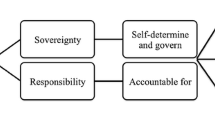Abstract
Action research and classroom assessment, school-based strategies for professionalizing teaching and reforming schools, have begun to receive attention as a strategy for accomplishing similar goals in higher education.In this article, the authors describe the important role that context plays in supporting teachers' action research efforts.The description of the context that supports action research in one university will be useful to higher education faculty and administrators who are working to create similar contexts to support action research or classroom assessment by faculty.
Similar content being viewed by others
References
Abelson, M.A., & Woodman, R.W. (1983). Review of research on team effectiveness: Implications for teams in schools. School Psychology Review, 12, 125–136.
Angelo, T.A. (1991). Introduction and overview: From classroom assessment to classroom research. In T.A. Angelo (Ed.). Classroom research: Early lessons from success (pp. 7–15). San Francisco: Jossey-Bass.
Angelo, T.A. & Cross, K. P. (1993). Classroom assessment techniques. San Francisco: Jossey Bass.
Belenky, M., Clinchy, B., Goldberger, N., & Tarule, J. (1986). Women's ways of knowing: The development of self, voice, and mind. New York: Basic Books.
Bondy, B. Griffin, C. Ross, D. & Sindelar, P. (1995). Elementary and special educators learning to work together: Team building processes. Teacher Education Special Education, 18(2), 91–102.
Carr, W., & Kemmis, S. (1986). Becoming critical: Education, knowledge, and action research. London and Philadelphia: The Falmer Press.
Cochran-Smith, M., & Lytle, S. (1993). Communities for teacher research: Fringe or forefront? In M. Cochran-Smith & S. Lytle (Eds.), Inside/outside: Teacher research and knowledge (pp. 85–103). New York: Teachers College Press.
Corey, S.M. (1954). Action research in education. Journal of Educational Research, 47, 375–380.
Cross, K. P. (1990). Classroom research: Helping professors learn more about teaching and learning. In P. Selden and Associates (Eds.) How administrators can improve teaching (pp. 122–142). San Francisco: Jossey Bass.
Cross, K.P., & Angelo, T.A. (1989). Faculty members as classroom researchers. Community Technical and Junior College Journal, 59(5), 23–25.
Fosnot, C. T. (1989). Enquiring teachers: Enquiring learners. New York: Teachers College Press.
Gore, J.M., & Zeichner, K.M. (1991). Action research and reflective teaching in preservice teacher education: A case study from the United States. Teaching and Teacher Education, 7, 119–136.
Hysmith, C. (1994). What I Bring With Me Is More Than My Luggage. Unpublished manuscript.
Hysmith, C., Bondy, E., & Ross, D.D. (1995). They all talk the talk but what does it really mean? Paper presented at the annual meeting of the American Educational Research Association, San Francisco.
Kamii, C. (1991). Toward autonomy: The importance of critical thinking and choice making. School Psychology Review, 20, 382–388.
Kember, D., & Grow, L. (1992). Action research as a form of staff development in higher education. Higher Education, 23, 297–310.
Kyle, D.W., & Hovda, R.A. (1987). Teachers as action researchers: A discussion of developmental, organizational, and policy issues. Peabody Journal of Education, 64(2), 80–95.
Miller, J.L. (1990). Creating spaces and finding voices: Teachers collaborating for empowerment. Albany: State University of New York Press.
Miller, D.M., & Pine, G.J. (1990). Advancing professional inquiry for educational improvement through action research. Journal of Staff Development, 11(3), 56–61.
Noffke, S.E., & Zeichner, K.M. (1987). Action research and teacher thinking: The effect of first phase of the action research cycle on action research projects at the University of Wisconsin—Madison. Paper presented at the annual meeting of the American Educational Research Association, Washington, D.C.
Oja, S.N., & Pine, G.J. (1987). Collaborative action research: Teachers' stages of development and school contexts. Peabody Journal of Education, 64, 96–115.
Parson, S.R. (1994). Program development, team instruction, and the impact on faculty members. NASSP Bulletin, 78(559), 62–64.
Robinson, B., & Schaible, R.M. (1995). Collaborative teaching: Reaping the benefits. College Teaching, 43(2), 57–59.
Rodgers, C.R. (1993). Mentoring each other: Teacher educators as learners of teaching. Unpublished manuscript, The School for International Training, Brattleboro, VT.
Ross, D. D., & Bondy, E. (1996a). The evolution of a college course through teacher educator action research. Action in Teacher Education, 18(3), 43–54.
Ross, D. D., & Bondy, E. (1996b). The continuing reform of a teacher education program: A case study. In K. M. Zeichner, S. L. Melnick, & M. L. Gomez (Eds.), Currents of reform in preservice teacher education (pp. 62–79). New York: Teachers College Press.
Ross, D., & Krogh, S. (1988). From paper to program: A story from elementary PRO-TEACH. Peabody Journal of Education, 65(2), 19–34.
Ross, D. D., & Smith, W. (1992). Understanding preservice teachers' perspectives on diversity. Journal of Teacher Education, 43(2), 94–104.
Sanger, J. (1990). Awakening a scream of consciousness: The critical group in action research. Theory Into Practice, 29, 174–178.
Senge, P. M. (1990). The fifth discipline: The art and practice of the learning organization. New York: Doubleday Currency.
Senge, P. M., Kleiner, A., Roberts, C. Ross, R. B., & Smith, B. J. (1994). The fifth discipline: Strategies and tools for building a learning organization. New York: Doubleday.
Additional information
Dorene Ross: Curriculum and Instruction from the University of Florida USA
Rights and permissions
About this article
Cite this article
Bondy, E., Ross, D. Teaching Teams: Creating the Context for Faculty Action Research. Innovative Higher Education 22, 231–249 (1998). https://doi.org/10.1023/A:1025191527703
Issue Date:
DOI: https://doi.org/10.1023/A:1025191527703




